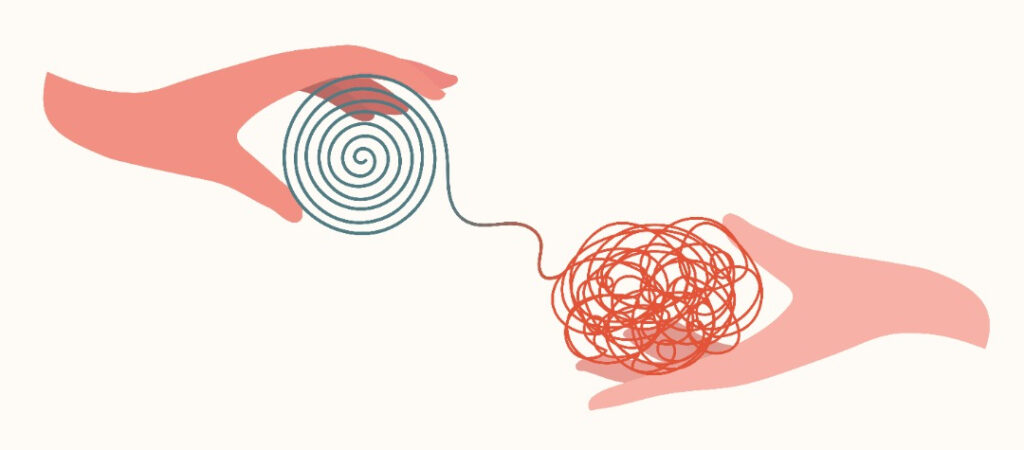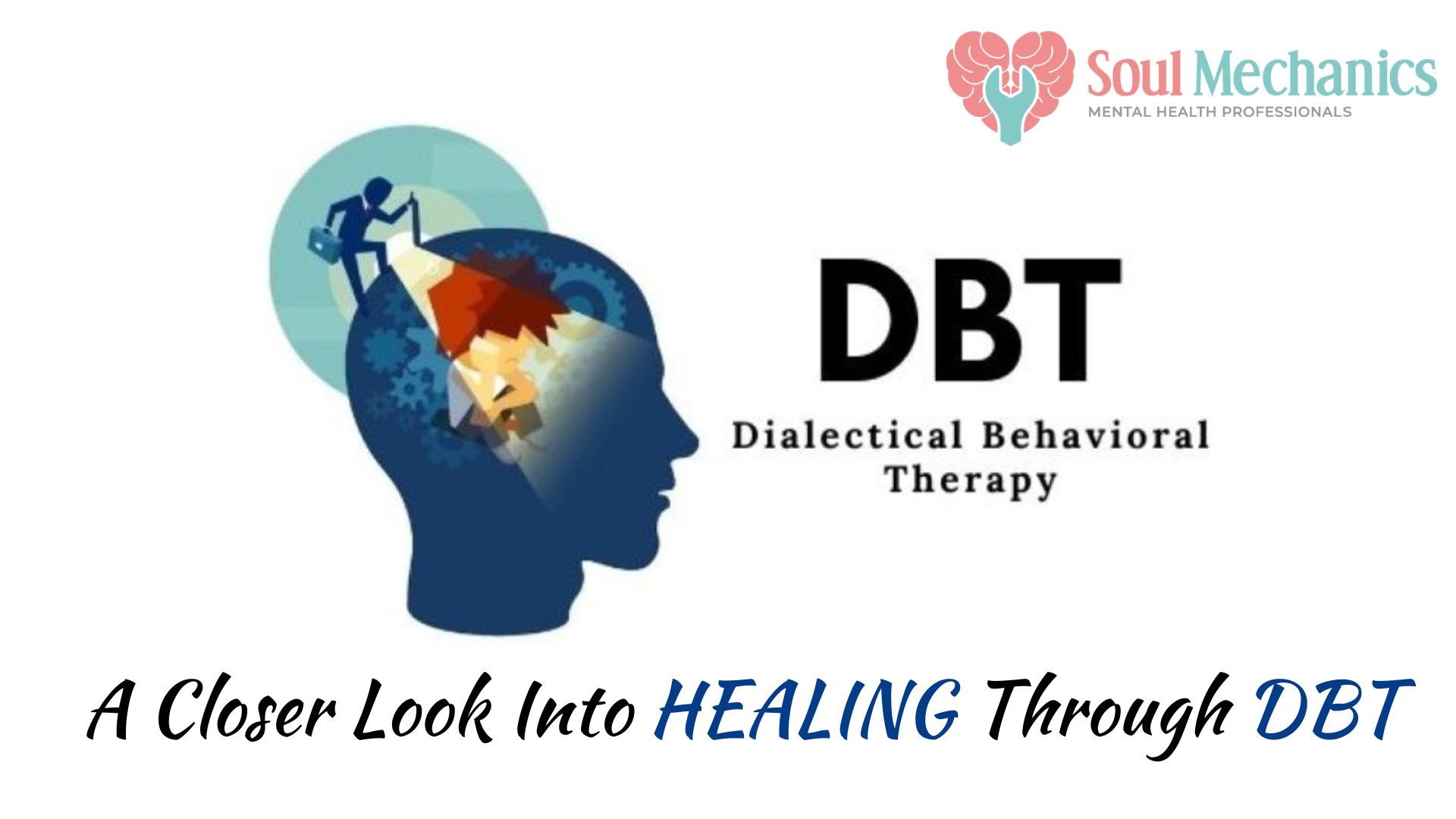Dialectical Behavior Therapy (DBT): A Journey Into DBT
Dialectical Behavior Therapy (DBT): A Journey Into DBT
Dialectical Behavior Therapy (DBT) is a type of talk therapy or in others, it is a modified type of Cognitive Behavioral Therapy (CBT). DBT is a versatile framework that combines the insights from CBT and the wisdom of mindfulness to offer an approach that works on managing one’s emotions, reducing self-destructive thoughts and behaviours, and improving one’s overall mental health. With an emphasis on acceptance and readiness to change, DBT navigates individuals facing emotional dysregulation and other mental health concerns. DBT is also often integrated with other therapeutic approaches such as Acceptance and Commitment Therapy (ACT) and Cognitive Behavioral Therapy (CBT), further enhancing its effectiveness.
In this article, we will further embark on understanding how DBT is different from CBT, its stages, techniques, benefits, and so on. Let us shed some light on how DBT navigates one to discover resilience, balance and a sense of control over their lives.
Dialectical Behavior Therapy (DBT) Vs. Cognitive Behavior Therapy (CBT)
How is DBT different from CBT? Although it sound almost similar and shares some concepts together, DBT and CBT are two different approaches. For instance:
l CBT emphasizes assisting one to change their unhealthy ways of thinking and behaving.
Whereas,
l DBT does it too, but at the same time, it also emphasizes accepting who one is.
l Compared to CBT, DBT usually involves more group work/group sessions.

Stages of Dialectical Behavior Therapy (DBT)
There are several stages of framework a DBT practising mental health practitioner would utilize during the session. These stages are divided into four.
1. Stage 1
The first stage of DBT involves exploring and identifying the most concerning self-destructive thinking patterns and behaviours. This includes thoughts and acts of self-injury or suicide.
2. Stage 2
Upon addressing self-destructive thoughts and behaviours, the therapeutic process moves on to identifying the issues that affect the individual’s life quality. This includes interpersonal issues, emotional dysregulation, and difficulty tolerating distress.
3. Stage 3
The next stage involves focusing and working on issues that are related to interpersonal relationships and self-esteem.
4. Stage 4
This final stage emphasizes on assisting one to obtain the most out of their life. This includes exploring ways to pursue life goals, deepen relationships, and experience increased happiness.

Techniques of Dialectical Behavior Therapy (DBT)
Let us dive deeper into the therapeutic techniques of DBT. Four main techniques are often utilized by a DBT practising therapist.
1. Core Mindfulness.
One of the core components of DBT is mindfulness. By instilling mindfulness, one can be more aware of their emotions, thoughts, and other bodily sensations, leading to better insights regarding their internal world. It also facilitates one to be fully aware of their present experiences with a sense of self-critical or judgment.
2. Emotional Regulation.
One of the key emphases of DBT is mastering emotional regulation. A therapist assists one in addressing and name their emotions accurately. Identification of emotions helps one to effectively develop strategies to manage the intense emotions they experience. These strategies include emotional awareness, enhancing positive emotions, and regulating intense emotions in healthier ways.
3. Distress Tolerance.
A DBT practising therapist would assist one in equipping themselves with distress tolerance skills to cope with their unavoidable distress and challenges. This includes gradually coming to terms with reality, exploring ways to soothe oneself, and distracting oneself from distress when needed. Learning distress tolerance skills leads one to avoid self-destructive behaviours during the crisis and navigate their issues healthily.
4. Interpersonal Effectiveness.
Healthy relationships with self and others are the heart of one’s emotional well-being. Through DBT’s interpersonal effectiveness technique, along with a therapist's assistance, one learns to communicate effectively, assert needs without compromising self-respect, and set boundaries. This reduces conflict and leads to harmonious and improved interactions with others.

Benefits of Dialectical Behavior Therapy (DBT)
Initially, DBT was developed to treat individuals who are experiencing borderline personality disorder or who struggle to control their emotions. However, DBT is now widely being utilized for other mental health concerns such as depression, anxiety, post-traumatic stress disorder (PTSD), addictions, eating disorders, etc. There are many benefits one can gain through practising DBT along with a trained and certified mental health practitioner.
1. Improved Emotional Management & Regulation.
One of the main benefits of DBT is its effectiveness in improving one’s emotional regulation. Those who are struggling with fluctuations in mood, anger outbursts, or other emotional instability can learn to control and manage their emotions better through DBT. This ability to regulate emotions often leads to enhanced relationships and personal growth.
2. Enhanced Self-Awareness.
Since DBT also focuses on mindfulness, it leads one to gradually improve their self-awareness. With the assistance of a therapist, one learns to be more attuned and aware of their feelings, thoughts, and behaviours. This allows them to make more conscious choices instead of reacting based on emotions, leading to skillfully responding to obstacles in life.
3. Reduction in Self-Destructive Thoughts and Behaviours.
Through DBT, a therapist would also assist one with alternative coping strategies for their self-destructive thoughts and behaviours, further assisting them to break from their unhealthy patterns and replace them with healthier ones while managing distress. These benefits reduce self-harming behaviours, especially among individuals experiencing borderline personality disorder.
4. Improved Interpersonal Relationships.
Apart from learning to regulate emotions and break destructive behaviours, DBT also helps one to learn to be more vocal about their needs, listen empathetically, and constructively resolve their issues. This leads to improved and healthier relationships with family, partners, friends, and people around.
5. Enhanced Personal Growth & Healing.
DBT also equips one with the needed tools to navigate the ups and downs of life, leading one to have a more meaningful and fulfilling life. It aims to enhance the life quality of one who is struggling with self-destruction and emotional dysregulation issues.
6. Relapse Prevention
By exploring and practising alternative coping skills and emotional regulation techniques, one is less likely to relapse. DBT is known as one of the effective approaches in preventing relapse and assisting one to maintain the progress they made in therapy.

Conclusion
In short, just like other therapeutic approaches, DBT has its own unique and profound benefits in assisting individuals experiencing mental health concerns, especially regarding emotional regulations and self-destructive behaviours. Whether applied as a standalone therapy or being integrated with other therapeutic approaches, DBT provides one with a path towards healing and emotional balancing.
DBT continues to illuminate light in many lives and prepares them to be more emotionally resilient. It also offers a holistic type of approach to healing by addressing various aspects of an individual’s life such as emotional, cognitive, and behavioural aspects, leading to a long-lasting change experienced through therapy.
“Mastering Emotional Regulation Unlocks Doors Of Resilience And Self-Discovery”.
To learn more about Cognitive Behavioral Therapy (CBT), you can click here.
For more content related to mental health do follow us on our official Instagram.

